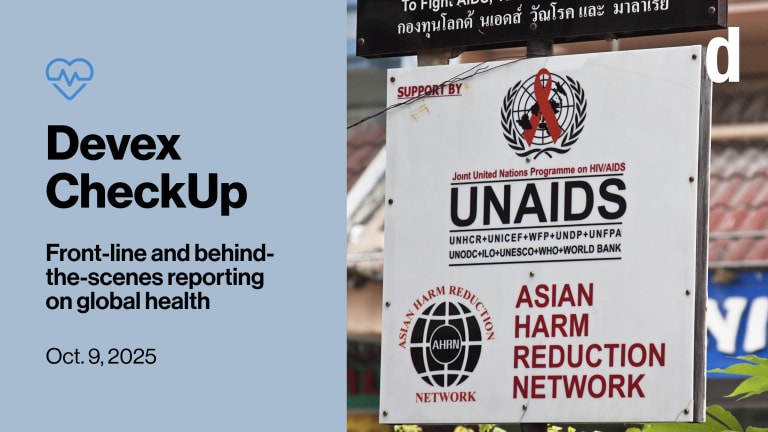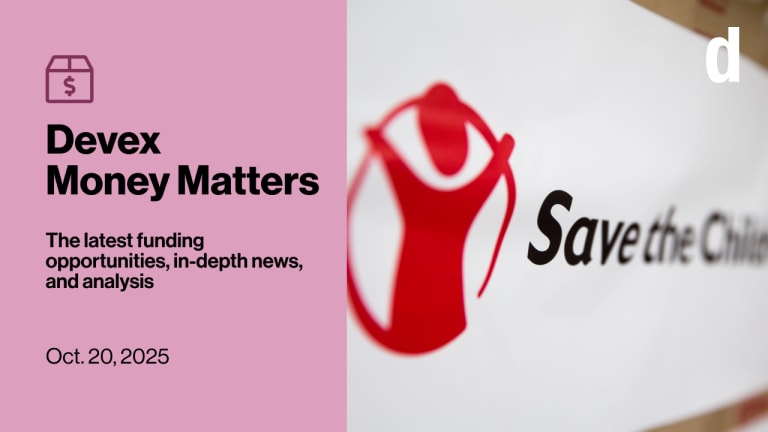Special edition: The World Health Summit focuses on opportunity amid a funding crisis
Presented by Eleanor Crook Foundation

This year’s World Health Summit appeared to draw more people than ever, who gathered to discuss what was missing. An estimated 4,000 people turned up in Berlin eager to think about what the future of the global health response should look like in an era of reduced aid and declining multilateralism.
It was actually difficult to keep track of all of the panels on reimagining the global health architecture — and even more difficult to get into them. If you made it inside, it was often to hear leaders from governments, industry, multilateral institutions, and United Nations agencies describe the funding crisis as an opportunity. There were a lot of calls to shift how global health systems are imagined, who sets priorities, and who funds them.
Global south leaders arrived with a more granular vision of an emerging global health architecture that must rest on sovereignty and solidarity. While they welcome partners, they cautioned that all efforts moving forward should be built collaboratively.
While this vision, known as the “Accra Reset,” seemed to gain some momentum in Berlin, most discussions seemed to end with an agreement that conversations need to continue. More concrete decisions may have been taken on the upper floors of the InterContinental Berlin, but those meetings were shut off to all but the VIPs.
There was also much emphasis on the ongoing importance of multilateralism and solidarity. This happened in the absence of U.S. officials, who stayed away from the summit amid the ongoing government shutdown in Washington.
German officials did back up their commitment to multilateralism with a €1 billion pledge to the Global Fund to Fight AIDS, Tuberculosis and Malaria over the next three years. This drew much acclaim, despite being €300 million less than the German commitment during the Global Fund’s last fundraising cycle. That seemed to reflect just how dire the aid situation has become — and why so many people were so eager to figure out what the future global health response is going to look like.
Read: Germany commits €1B to Global Fund as aid cuts shape World Health Summit
+We launched a new series on The Future of Global Health, which digs into the ripple effects of foreign aid cuts and the search for a new path forward.
Redefinition
Speaking of the Accra Reset, when Ghanaian President John Mahama was describing the initiative on the sidelines of the 80th U.N. General Assembly last month, he included the private sector among his “partnership of the willing.” These are the collaborators who will work with governments to figure out how to most effectively achieve countries’ health system priorities.
At Devex, we were wondering how the private sector felt about that. So we put together a panel on the sidelines of WHS to find out.
It turns out representatives from the pharmaceutical industry were pretty enthusiastic about a shift in the way they have traditionally engaged with governments.
Amy Niambo Ndao-Fall, who is the head of the medical global health unit at Sanofi, told me: “The private sector is not really well used. When you go for a partnership, the first thing they ask you is how much money you’re going to give. We’re not donors at all. We are partners, and where we can support, really, is technical support. We are focused on results.”
Read: Where does the private sector fit in the Accra Reset?
Background reading: The ‘Accra Reset’ — time’s up for the legacy aid system
Heating up
That’s not all Devex was up to in Berlin. We hosted a high-level roundtable with Sanofi, gathering key international organizations, policy leaders, and delivery partners to discuss the future of yellow fever prevention in a changing climate. The discussion explored how new vaccine technologies can strengthen outbreak preparedness, improve stockpile strategies, and enhance equitable partnerships.
The participants underscored the growing urgency to adapt global immunization systems to climate-driven disease expansion and advance innovation that supports faster, more sustainable epidemic response.
Background: Will climate change-fueled drought spur more yellow fever outbreaks?
Hold on
UNAIDS officials told the WHS that the fate of their program is not yet decided.
When U.N. Secretary-General António Guterres released a report last month calling for the agency to sunset next year, Christine Stegling, a UNAIDS deputy executive director, said it was “formulated as a decision.”
That’s not actually the case, she said Tuesday during a WHS panel discussion. Describing it as a “proposal,” she said member states would meet with Guterres today in New York to provide feedback “on all of the proposals” in the report.
Working in consultation with communities, member states, and donors, UNAIDS had already taken steps to potentially wind down operations by 2030.
“We were on a pathway that included those most affected,” Stegling said. The accelerated timeline Guterres is proposing “does not include those voices. That’s why we’re seeing a lot of pushback from those communities.”
Read: UNAIDS faces uncertain future amid UN reform push
ICYMI: Top UN official defends reform agenda as genuine, despite skepticism (Pro)
+ Curious about the insights that drive global development? For a limited time, experience the power of Devex Pro with a 15-day free trial. Explore expert analyses, unlock hidden funding opportunities, connect with key players at exclusive events, and access a wealth of knowledge you won’t find anywhere else. Check out all the exclusive content available to Pro members.
Good news, bad news
There was some breaking news at this year’s WHS. Not all of it was good.
Attendees learned that global life expectancy in 2023 was back to the level it was before the COVID-19 pandemic, according to an important study on the causes of worldwide deaths and disability that launched Sunday. But that news was marred by widespread disparities in outcomes, including a 30-year difference in life expectancy between people living in the Central African Republic and those living in Singapore, according to Christopher Murray, who heads the Institute for Health Metrics and Evaluation.
The new Global Burden of Disease study, which looked at data from 1990 until 2023, also charted a massive rise in noncommunicable diseases, such as cardiovascular disease and diabetes. But again, the impact was disproportionate.
“There were huge transitions, but particularly intense in the middle-income world,” explained Murray, whose IHME built the study with the support of a network of 16,500 researchers drawing on more than 300,000 data sources.
Experts also sounded the alarm about the rising impact of heat, which, in addition to being a health risk in itself, exacerbates other conditions. Michael Brauer, a professor at the University of British Columbia, warned that those effects are about to get worse, particularly in poorer populations.
“While we’ve been effective in high-income countries in dealing with heat through air conditioning, that’s just not going to be accessible for much of the world’s population,” he said. “We’re just at the start of this and unfortunately, that picture does not look that great.”
Related: As heat affects workers worldwide, health policies struggle to keep up
Surviving the vucaverse
The Global Preparedness Monitoring Board also launched a new report, latching on to a decades-old acronym to describe the chaos of the current age. The authors described a VUCA world — one marked by volatility, uncertainty, complexity, and ambiguity. That adds up to a world that remains “dangerously underprepared” for a pandemic, according to Kolinda Grabar-Kitarović, who is the board cochair.
To meet that challenge, she called for improved efforts to care, measure, and cooperate. That means stronger primary health care systems — “care” — and ratification of the pandemic agreement, or “cooperate.” To “measure,” the report proposed the development of a global pandemic risk observatory. The idea is to have a single mechanism that can take all of the different analyses floating around and offer an overarching evaluation of pandemic risks.
Meanwhile
Not all of the action in Berlin was taking place in the InterContinental this week. Civil society organizations convened their own meeting Tuesday, a few kilometers away from the WHS.
They used the event to decry cuts to global health funding, even by professed allies of the sector, and to warn that the far right would exploit the current crisis to its own ends. As Washington imposed restrictions on health funding, particularly in areas such as sexual and reproductive health and rights, Sophie Harman encouraged civil society groups and NGOs not to cede ground.
“People overapply the gag rules,” said Harman, who is a professor of international politics, leaving space for far-right organizations to take over programs.
+ Enjoyed this special edition of the Newswire? To continue exploring topics in this depth, Devex CheckUp — our free weekly global health newsletter — is your go-to resource. Sign up today.
Search for articles
Most Read
- 1
- 2
- 3
- 4
- 5








